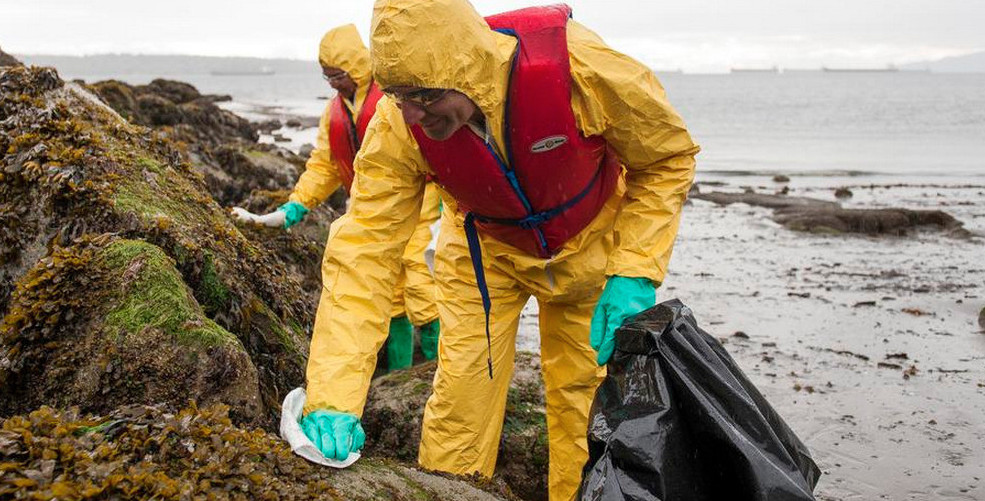Nobody knows how a spill of diluted bitumen would affect marine life or whether a bitumen spill in salt water could be adequately cleaned up, because basic research is lacking, says a new study.
The peer-reviewed paper, which will be published later this month in the journal Frontiers in Ecology and the Environment, looked at more than 9,000 studies of the effect of oilsands products on the marine environment.
The paper is under embargo until Dec. 20, but the authors, from universities in Canada and the U.S., shared their findings with the federal government in hopes that the conclusions would be considered prior to pipeline decisions, said Wendy Palen, associate professor in the department of biological sciences at Simon Fraser University and one of the authors.
“As scientists, we feel a responsibility to speak out about the state of the science, especially with a government that has pledged to be evidence-based,” said Palen, who agreed to discuss general conclusions of the study with DeSmog Canada in advance of the embargo being lifted because of the government’s approval of Kinder Morgan’s $6.8-billion pipeline expansion.
The project will see capacity of the Trans Mountain pipeline, from the Alberta oilsands to Burnaby, triple to 890,000 barrels of diluted bitumen a day from 300,000 barrels daily. It will also mean tanker traffic from the Burnaby terminal will increase to 34 tankers a month from about five a month.
Those super-tankers, carrying diluted bitumen, will travel through the Strait of Georgia, around the Gulf Islands and southern Vancouver Island then through Juan de Fuca Strait on their way to foreign markets.
Pipeline opponents fear that a catastrophic oil spill is inevitable, but Prime Minister Justin Trudeau insists the government’s decision was based on science and that the project would have been rejected if he believed there was any threat to the B.C. coast.
However, the study found that there are large unexamined risks to the marine environment from bitumen and claims that a spill can be effectively mitigated are unfounded because 
“That means that the approval of new projects is problematic, maybe even bordering on irresponsible,” she said.
“Any new approvals of pipelines or transportation proposals are assuming a large amount of risk…The decision last week was troubling because of this knowledge gap.”
Transportation of heavy oil from Alberta’s oilsands has outpaced the science that can ensure projects are safe and although thousands of peer-reviewed studies are available on the behaviour of conventional oil and spills in fresh water, there is almost nothing on the behaviour of bitumen in the ocean, Palen said.
Review of 9000 Studies Finds We Know Squat About Bitumen Spills in Ocean Environments https://t.co/S2Zpkb8WCD #bcpoli #cdnpoli @LavoieJudith
— DeSmog Canada (@DeSmogCanada) December 9, 2016
One of the few studies looking at bitumen in the marine environment found it tends to float until it weathers and then sinks, but that study was conducted in the laboratory, not in the ocean.
One reason that the science is so sparse is that companies will not disclose what chemical mix is going into the pipe.
“The composition is protected as a corporate trade secret and the companies don’t have to disclose it. That’s something we called for in our letter to the Prime Minister and cabinet. We, in the scientific community, urgently need that information in order to allow science to catch up,” Palen said.
“We were quite surprised about it and concluded that some of the most basic questions remain unanswered.”
Bitumen is a very heavy oil that will not flow through a pipe without being diluted. Usually lighter petroleum products such as natural gas concentrate, refined naptha or synthetic crude oil are used to make it flow.
A previous study on diluted bitumen, by the U.S.-based National Academy of Sciences, found that, unlike lighter compounds that begin to evaporate when spilled, heavy oil weathers into an adhesive, dense viscous material when exposed to the elements.
“For this reason, spills of diluted bitumen pose particular challenges when they reach water bodies. In some cases, the residues can submerge or sink to the bottom of the water body,“ it says.
The study found that a pipeline failure that releases diluted bitumen poses danger to responders and the public, as well as to the environment.
“When all risks are considered systematically, there must be a greater level of concern associated with spills of diluted bitumen compared to spills of commonly transported crude oils,” it says
Six years ago a diluted bitumen pipeline operated by Enbridge burst, spilling bitumen into a tributary of the Kalamazoo River. The spill cost more than $1-billion to clean up and put the spotlight on the hazards of pumping bitumen through pipelines.
Image: Responders clean up bunker fuel in Vancouver’s English Bay. Photo: West Coast Marine Response Corporation
Subscribe to our newsletter
Stay up to date with DeSmog news and alerts







